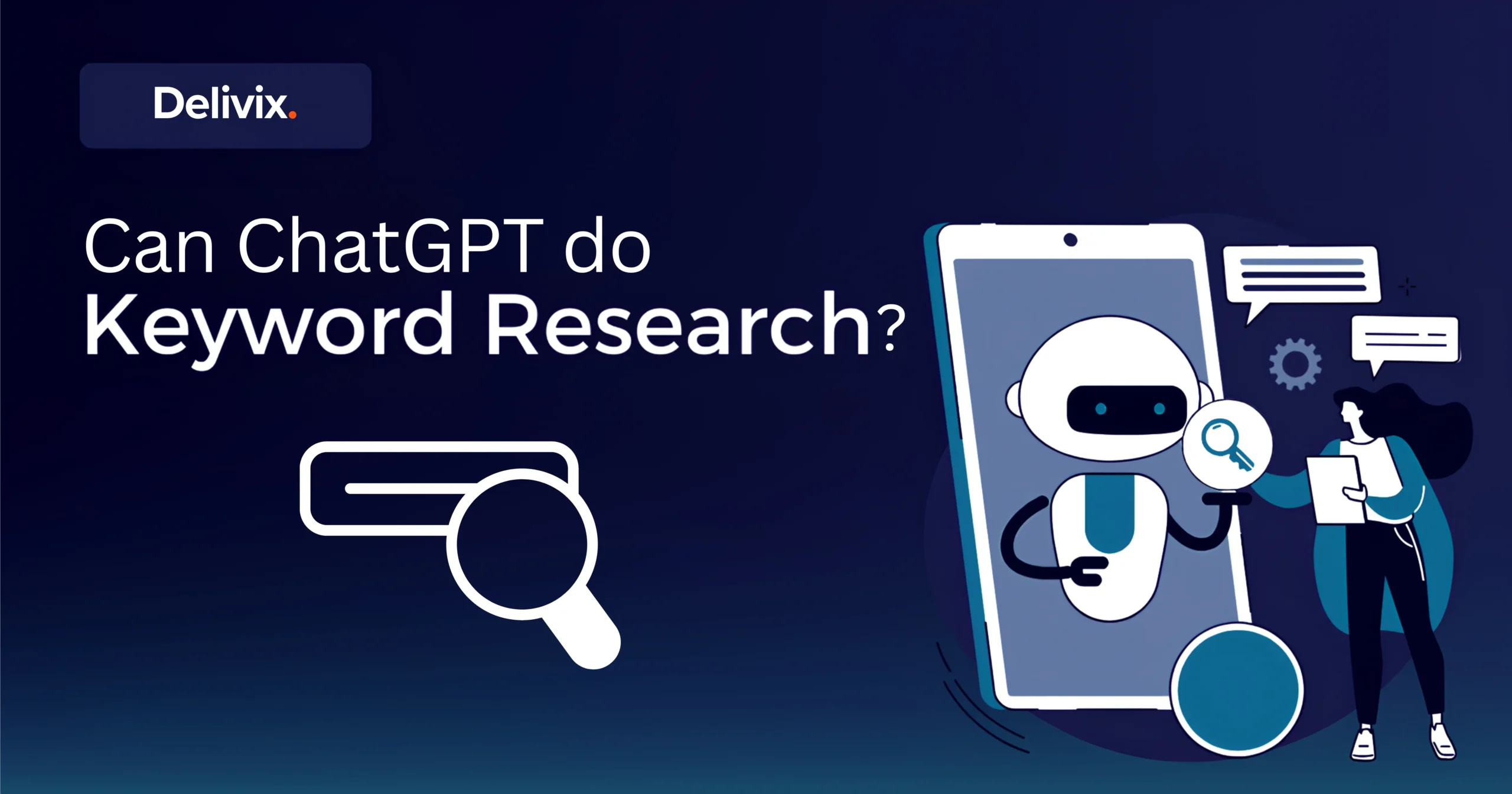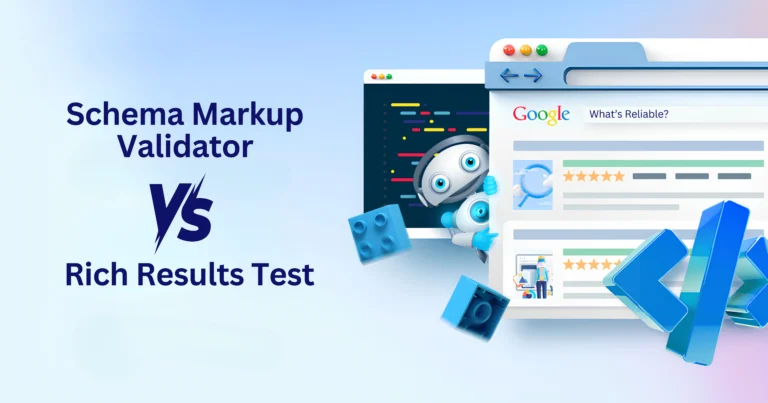Ever since OpenAI launched ChatGPT in November 2022, we have been hearing its buzz everywhere. According to a report by Backlinko, there are over 200 million active users worldwide. Huge numbers, right?
The tool has been helpful in almost every field, from marketing to academic writing. The same is true for keyword research in SEO and link building. But does this mean that the need for SEO experts is over? Not at all.
When used correctly, ChatGPT can be a great tool for keyword research. However, the problem is that not everyone knows how to use the tool correctly.
So, the general answer to the question, can ChatGPT do keyword research, is yes. This blog is your guide to understanding the pros and cons of using ChatGPT for keyword research and the best ways and prompts to use it aptly.
Can we use ChatGPT to get accurate keyword data?
Keyword research is one of the most important parts of SEO strategy. In fact, around 75% of marketers believe keyword research should be prioritised in the strategy-building process.
Before we answer, can ChatGPT do keyword research? Here is what the tool itself says.
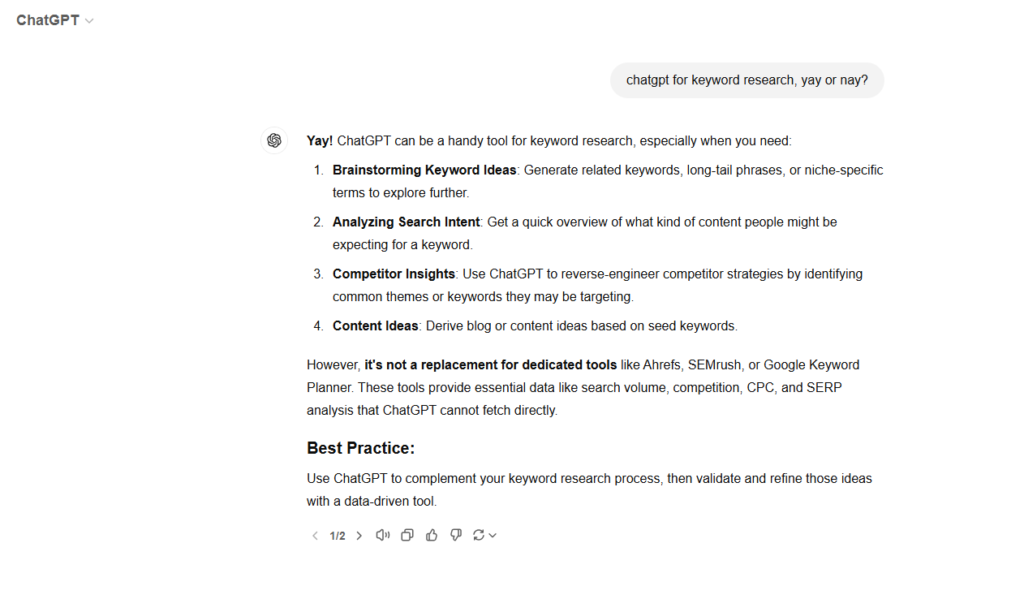
Screenshot from ChatGPT, December 2024
So, an analysis of ChatGPT’s response to the question is that while the tool does make brainstorming and finding new keywords easier, it is not a replacement for tools like SEMrush and Ahrefs. Still, if your website does not require you to have proper volume and CPC of keywords, there is no harm in using ChatGPT for keyword research.
Pros and cons of using ChatGPT for keyword research
Some of the benefits and disadvantages of using ChatGPT to do keyword research are listed below.
| Pro’s | Con’s |
|---|---|
| It can help you generate a range of keywords, like long-tail keywords, based on a seed keyword. | The tool cannot provide you metrics like search volume and keyword difficulty. |
| Helps you understand the intent behind keywords, which allows you to align your content strategy better. | Cannot access real-time search trends or geographically specific search behaviour. |
| Provides you with keyword-based topics and angles. | Cannot do SERP analysis to identify competition. |
| Unlike premium tools, ChatGPT is cost-effective for getting started with keyword research. | Unlike SEO tools, ChatGPT is not integrated with platforms like Google Ads. |
| Saves you tons of time, as it can generate lists of keywords or refine existing ones. | Not designed for bulk keyword research or comparing hundreds of keywords simultaneously. |
| Helps identify keyword strategies that your competitors may be using. | Cannot provide historical performance data. |
| Highlights gaps in your current strategy and suggests alternative keywords or content ideas. | May focus on generic or broad terms and miss niche keywords important for conversions. |
The verdict – Can ChatGPT do keyword research?
ChatGPT is an advanced conversational AI tool that can help you with all things SEO, including keyword research.
Focus on “can help”
This means that ChatGPT can be used to complement your SEO practices and not as a replacement for any tool. You can opt for a hybrid approach instead.
How to use ChatGPT for keyword research?
Now that we have briefly answered, “Can ChatGPT do keyword research?” let’s see how the tool can be your perfect SEO partner.
1. ChatGPT for a complete keyword strategy
As a keyword research expert, the most important thing is to make a stellar keyword strategy that would power the entire SEO and content guidelines. This task takes the most time. But what if we tell you that you can do it in seconds now?
Just use detailed ChatGPT prompts for keyword research. Here is an example of one such prompt.
| ChatGPT keyword research prompt 1 |
|---|
Act like a keyword research specialist who can create a full SEO plan. I want you to create a table which includes a list of keywords for the content SEO plan for <insert topic>. In the first column, add the top categories of keywords. The heading of this column will be ‘keyword cluster.’ The second column will show the keyword search intent (such as commercial and transactional). The third column will be named ‘long-tail keyword’ and will include 1 long-tail keyword for each super category. In the final two columns, add a title (of around 55–60 characters) and meta description (maximum length 152 characters). Do not write general statements. The meta description should show the value the content will provide to the user. |
Here is an example snapshot taken from ChatGPT for the keyword “digital marketing for healthcare.”
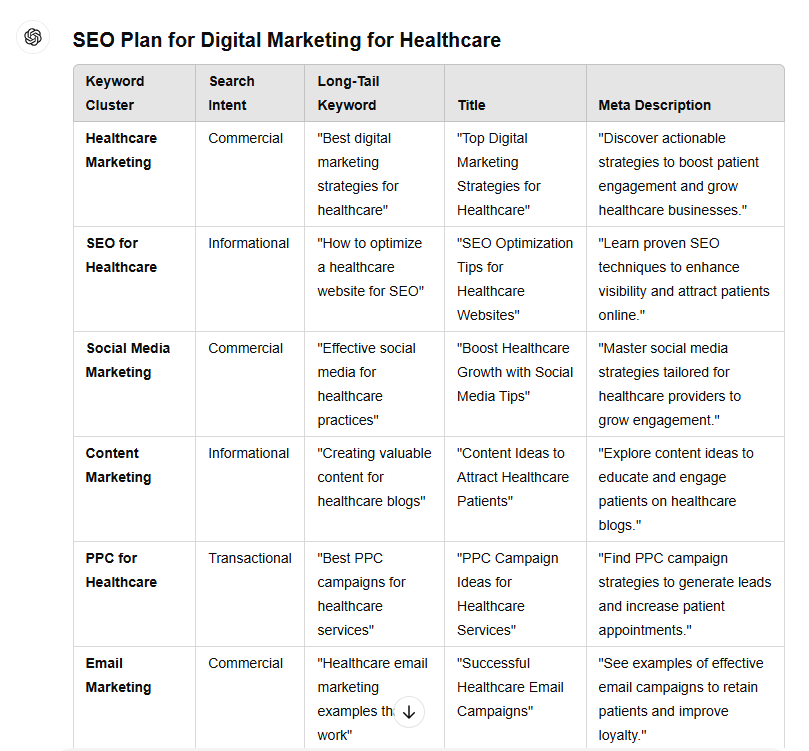
Screenshot from ChatGPT, December 2024
2. ChatGPT for semantic keyword research
Google updates in 2024 have all been about providing the best value to the reader through content. This also involves adding semantically related keywords to your text to ensure that the reader gets the most out of your content. You can also call these LSI or Latent Semantic Indexing terms.
| ChatGPT keyword research prompt 2 |
|---|
| List [X] LSI Keywords for “Seed Keyword” |
When we gave the prompt mentioned above to ChatGPT with the seed keyword “digital marketing consultation”, it responded with the following:
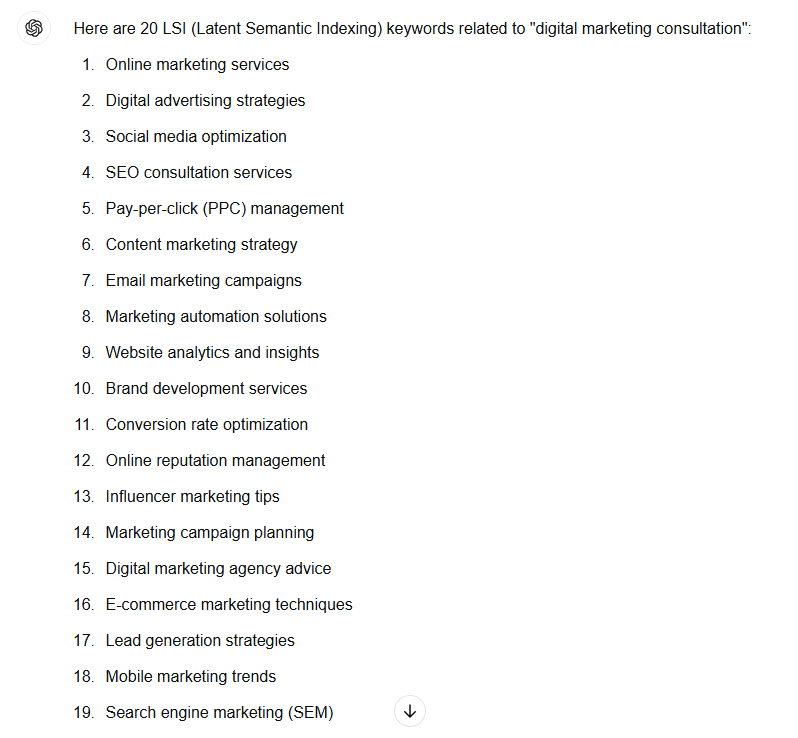
Screenshot from ChatGPT, December 2024
3. ChatGPT for keyword categorisation
This has also been discussed in the first point, but this is specifically for keyword categories if you already have a list of keywords.
We have all spent hours on spreadsheet formulas to make keyword categories and filter them according to our needs. Keyword categorisation is one of the most important tasks that ChatGPT has made easier for you.
| ChatGPT keyword research prompt 3 |
|---|
| Here is a list of keywords:“<insert list of keywords>.” Filter the keywords into categories, search intent, and target persona. Make a table with four columns accordingly. |
We provided this list of keywords to ChatGPT: [digital marketing consultation, digital marketing website, digital marketing company, best digital marketing solutions, how to open a digital marketing company, digital marketing, digital marketing UK].
This is the result we got:
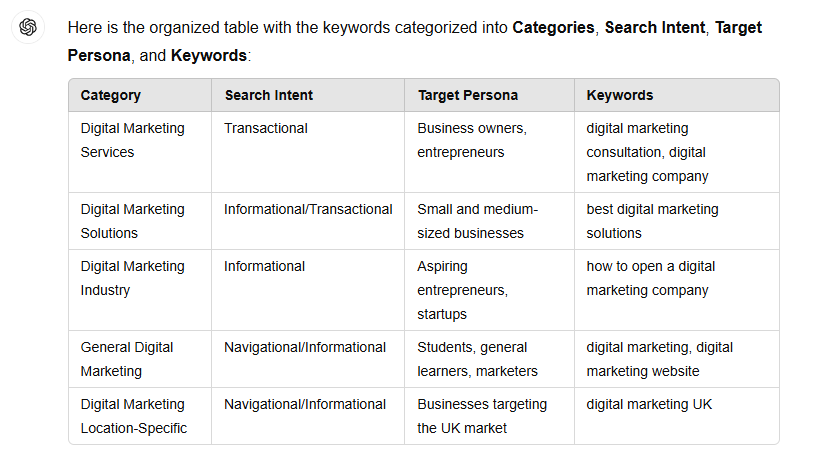
Screenshot from ChatGPT, December 2024
Bonus Tip: You can also add updated metrics such as search volume and keyword difficulty from the keyword research tool for even more detailed results.
Looking for SEO Services?
Our SEO experts will boost your rankings, drive traffic, and increase conversions.
Get Found. Get Leads. Get Sales.
Book a Consultation4. ChatGPT for keyword clustering
Many keywords have a similar intent. For example, the keywords, digital marketing consultation, digital marketing strategy consultation, online digital marketing consultation, marketing consultation services, and expert digital marketing services can all come under one cluster: digital marketing services.
Keyword clustering improves your visibility and authority and provides a better user experience. You can use ChatGPT for small amounts of keywords, but when it comes to large amounts of data, we advise you to find another keyword clustering tool. However, ChatGPT can still be a great starting tool.
| ChatGPT keyword research prompt 4 |
|---|
| Create a table with two columns. Each keyword should sit on its own row. Cluster the following keywords [list of keywords] into groups according to their semantic relationships. Give a short name to each group. |
We took keywords related to digital marketing [digital marketing, digital marketing agency, digital marketing jobs, what is digital marketing, marketing digital, freelance digital marketing, digital marketing salary, digital marketing agency near me].
This is the response from ChatGPT
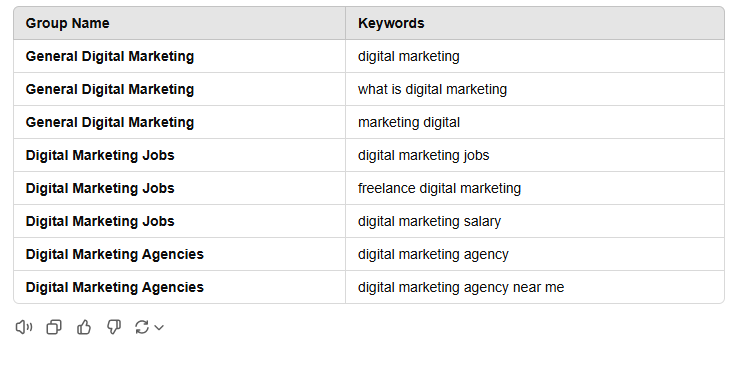
Screenshot from ChatGPT, December 2024
5. ChatGPT for keyword expansion by patterns
You may have noticed that there are certain patterns that keywords follow. For example, the question keywords always start with “who, what, where, how, why, do, are, will, does, can,” or comparison pattern would have keywords like “this vs that” and “top [].”
ChatGPT allows you to easily expand your target keywords through seed keywords.
| ChatGPT keyword research prompt 5 |
|---|
| Generate [X] keywords for the [topic] that contain any or all of the following: “who, what, where, how, why, do, are, will, does, can.” |
For the topic of digital marketing, this is what we got from ChatGPT:
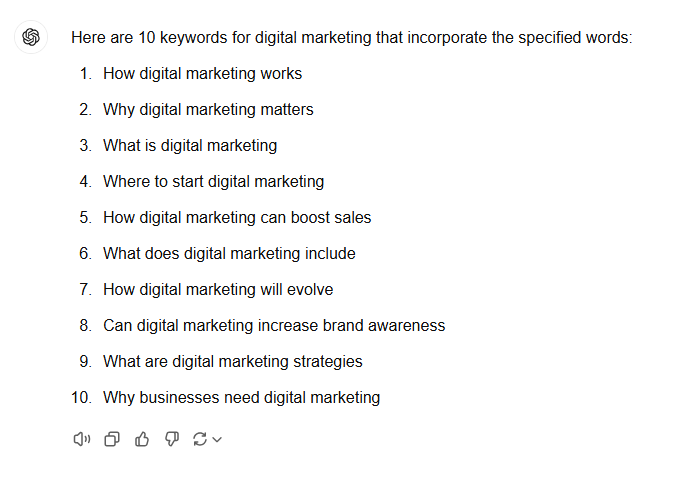
Screenshot from ChatGPT, December 2024
| ChatGPT keyword research prompt 6 |
|---|
| Generate [X] keywords for the [topic] that contain any or all of the following: “vs, for, alternative, best, review, top.” |
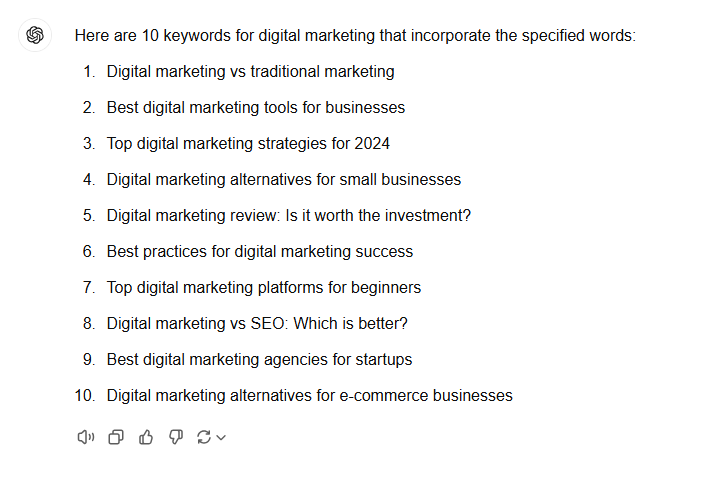
Screenshot from ChatGPT, December 2024
These are just two of the examples of patterns you can add. Others may include brand comparisons and search intent patterns.
6. ChatGPT for frequently asked questions
FAQs are a part of every keyword strategy nowadays. You can simplify the task of adding the FAQ section to your blog with the help of ChatGPT. You can also ask it to draft answers for the questions.
| ChatGPT keyword research prompt 7 |
|---|
| Generate [X] common questions related to [topic]. Provide answers as well of a maximum of 55 words each. |
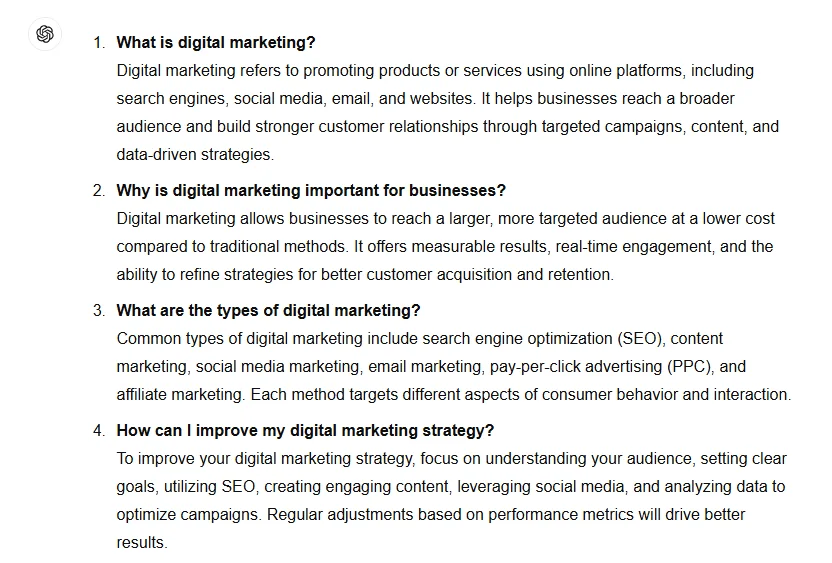
Screenshot from ChatGPT, December 2024
7. ChatGPT for extracting keywords from content
Let’s say you see well-written content on a competitor’s site and want to check the primary, long-tail, or semantic keywords they have used to draft the content. Enters ChatGPT – it will help you reverse-engineer the task.
| ChatGPT keyword research prompt 8 |
|---|
| Find keyword ideas from the following text [add content]. |
We provided a short version of a blog by Neil Patel to ChatGPT. It provided around fourty keywords in response to it. Here is a snapshot of some of them.
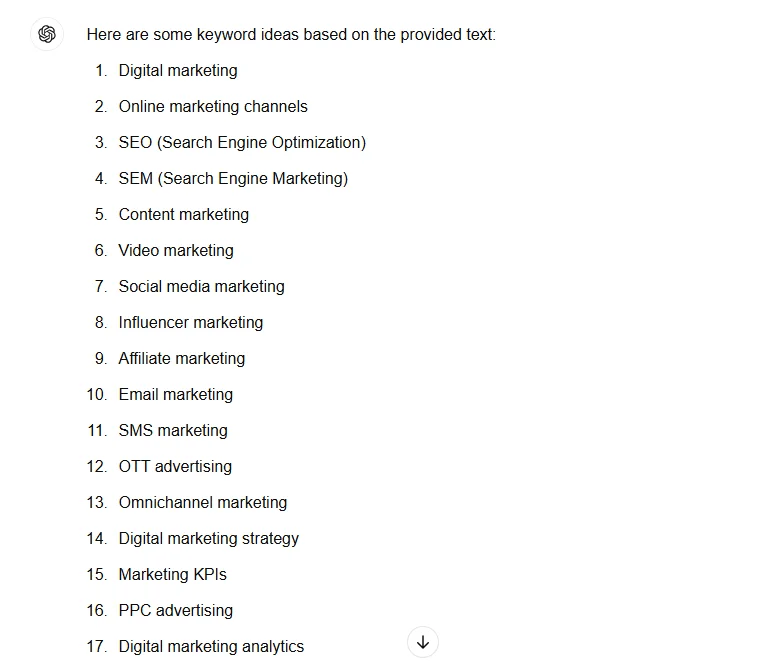
Screenshot from ChatGPT, December 2024
Tips to use ChatGPT for keyword research
Aren’t these easy ways to improve the SEO of your website? These are just some of the ways that you can use ChatGPT for keyword research. The possibilities for marketers to use the tool are endless.
To make the experience even better, here are some tips that you should consider before you ask yourself, can ChatGPT do keyword research?
The more detailed the prompt, the better the result
Rather than using a prompt that says, “Find keywords related to digital marketing,” write something like “Find keywords related to digital marketing that target businesses and how they can improve their digital presence.”
You should always provide a comprehensive prompt to get specific results and help ChatGPT understand what exactly you want.
Always proofread the results you get from the tool
This cannot be said enough. We hear funny stories on LinkedIn about people who send emails after generating them from ChatGPT, and they forget to edit them. This mistake can cost you professionally. Moreover, since it is a model, it may also, at times, deliver incorrect results.
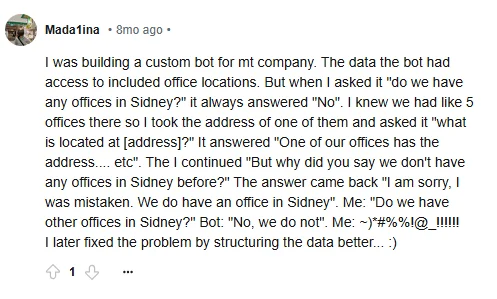
Screenshot from ChatGPT, December 2024
Therefore, always proofread what you get from ChatGPT.
Do not use just ChatGPT for keyword research
It is always better to not use ChatGPT alone. Instead, use it as a supplement with other reliable tools, like SEMrush and Ahrefs.
For instance, do your keyword research with metrics like search volume, KD, and CPC from some other tool and then ask ChatGPT for clustering.
Read More: What is computer vision in AI?
Frequently Asked Questions
- Google Keyword Planner
- Ahrefs
- SEMrush
- Moz Keyword Explorer
- Ubersuggest
